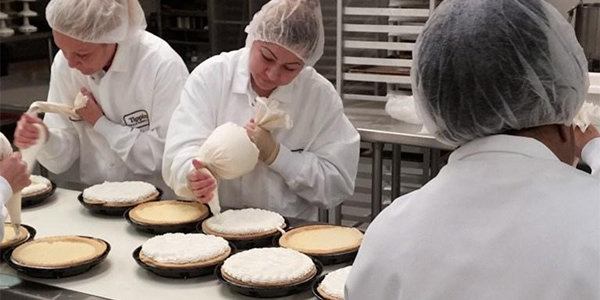Volume 3 | Issue 1

The iconic good-natured baker is solidly embedded in our culture: the man with the big, white puffy hat, apron, shirt rolled up to the elbows and fairly invisible for all the white flour on his skin and clothes. But how about a baker that needs to program the latest in state-of-the-art ovens, who needs to know as much about advances in baking technology as he does portions of yeast?
This is the image of the modern baker, perhaps still up to his collarbone in flour, but now letting his fingers fly over an electronic keyboard to develop the best baking recipe for a product that must satisfy 21st century consumer tastes.
Keeping its fingers in the thick of the innovative crust is the American Bakers Association, the national trade association of bakers and their suppliers representing approximately 80 percent of baked goods sold in the United States. As advocates for the baking industry, ABA represents the industry before the U.S. Congress, state legislatures and international policy making bodies where the bakers need a voice. Entering our 110th year of service to the industry, the mission of the American Bakers Association is to be an advocate for a stronger and more prosperous baking industry by providing information, education, member advocacy and networking opportunities.
As with any other industry that must innovate to keep up with demands, the baking industry is leading the way in the food sector with strong and progressive leadership. There are many opportunities to expand product lines with consumers’ growing interests in achieving a healthy lifestyle while attaining balance in their diets. Consumers’ preferences are becoming more diverse with a growing variety of bakery products, including many ethnic products, snacks, portables and single serve items.
With the 2005 revision of the Dietary Guidelines for Americans and the new MyPyramid.gov there is a greater emphasis on consumption of whole grain products and hence there have been a number of innovative whole wheat and whole grain products introduced to meet consumers’ preferences and tastes. ABA member companies are adept at developing products that meet consumer preferences. We are also seeing more options for breakfast, lunch, dinner and snacking occasions.
Bottom-line issues that impact bakers’ business bottom lines and ultimately their success include consumer preferences; ingredient costs; fuel costs; legislative and regulatory impacts; workforce recruitment and retention issues. Companies are also developing efficient processes for addressing a more diversified customer base resulting in an expanded product line.
A hot agenda
Technology is moving quickly and it offers many opportunities for the industry. Some of these key advancements were highlighted at our annual convention, held last March, which included a break out session to discuss technology development trends for equipment; ingredients and distribution – all key areas of interest.
A full service organization that pursues a government environment that promotes a robust baking industry, ABA offers resources and solutions for a wide variety of industry issues. Food labeling issues are foremost and include nutrition labeling, health claim opportunities, and allergen issues. Agribusiness, food safety, food defense and biotechnology, as well as opportunities to be proactive on behalf of the baking industry, are key. Last year, ABA was active in more than 30 issue areas. Some of our more recent accomplishments for the baking industry include:
Our association also successfully defeated a fuel surcharge provision in the Highway Bill legislation that would have placed a significant cost and liability burden on wholesale bakers.
ABA also develops critical industry policy and serves as a consensus building body on baking industry comments focusing on issues impacting key areas, and submitted to various government agencies including FDA, USDA and the Department of Labor among others. These include:
Historically, ABA has been a leader in policy circles in Washington, D.C. and in representing the position and best interests of our members. ABA has been instrumental in developing key business initiatives and making sure that bakers’ perspectives are considered at the policy table. ABA has chaired many business-oriented coalitions around town and with other wheat chain coalitions and organizations. While ABA might not be the biggest association in town, we are very effective at pushing our memberships’ agendas forward in a variety of arenas and are valued at the policy negotiation table.
The future
There are great opportunities for ABA to become more visible and to serve as a leader for the entire industry, including all segments of the baking industry. ABA is in the process of finalizing its strategic plan – a forward thinking vision for the future to strengthen the voice of the baking industry in all arenas. Setting the right priorities, our advocacy work, membership services and marketing are the foundation for a strong and successful ABA.
ABA is the leading organization providing leadership and guidance to the whole baking industry. ABA has been instrumental in coordinating industry wide meetings with other grain based food organizations to find common goals and objectives where our organizations can work together and streamline productivity.
Robb MacKie is president & chief executive officer and Lee Sanders is senior vice president, government relations & public affairs,for the American Bakers Association. Please visit: www.americanbakers.org
Scott Ellyson, CEO of East West Manufacturing, brings decades of global manufacturing and supply chain leadership to the conversation. In this episode, he shares practical insights on scaling operations, navigating complexity, and building resilient manufacturing networks in an increasingly connected world.